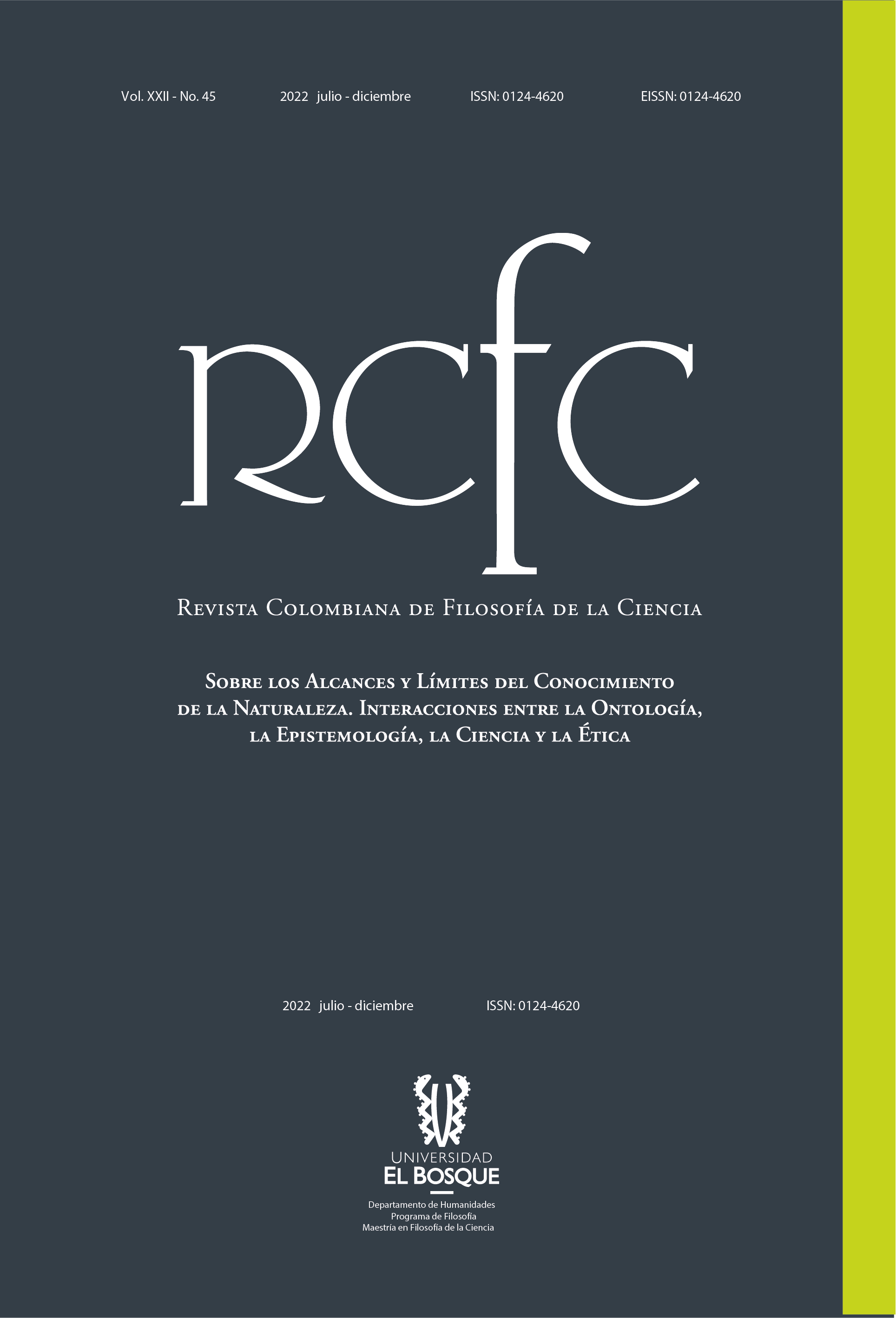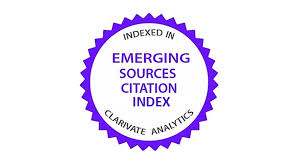En la época de la fábula del mundo
de la poesía cosmológica de Du Bartas a la imaginación filosófica de Descartes
DOI:
https://doi.org/10.18270/rcfc.v22i45.4199Palabras clave:
poesía cosmológica, Guillaume de Salluste du Bartas, imaginación, fábula del mundo, hipótesis, cartesianismo, probabilismoResumen
En las siguientes páginas propongo partir de un amplio marco temporal, llamado aquí la época de la fábula del mundo, para reflexionar en torno al episodio intelectual específico que va de la publicación de la poesía cosmológica de Guillaume Salluste du Bartas a la de Le Monde ou le traité de la lumière de René Descartes. En primer lugar, enfatizaré los puntos de vista que, desde la perspectiva de la poesía cosmológica, conciben a la filosofía natural como una especulación que finge un relato o fábula del mundo. En segundo lugar, señalaré las posturas críticas de Michel de Montaigne y de Francis Bacon a la imaginación filosófica por el afán que tiene de construir estos relatos ficticios del cosmos. En tercer lugar, caracterizaré los principios de la fábula cartesiana del mundo, identificando sus dimensiones epistémicas, físicas y metafísicas. Finalmente, consideraré las tensiones de los principios de Descartes que conllevan a la valoración de su filosofía natural como una teoría eminentemente especulativa.
Descargas
Referencias bibliográficas
Anstey, Peter R. “Experimental versus speculative natural philosophy”. The science of nature in the seventeenth century: Patterns of change in early modern natural philosophy, editado por Peter R. Anstey y John A. Schuster, Dordrecht, Springer Netherlands, 2005, pp. 215-242, https://doi.org/10.1007/1-4020-3703-1_9
Ariew, Roger. “The new matter theory and its epistemology: Descartes (and late scholastics) on hypotheses and moral certainty”. Vanishing matter and the laws of motion, editado por Peter Anstey y Dana Jalobeanu, Nueva York, Routledge, 2011, pp. 31-46.
Auger, Peter. “Du Bartas’ pattern for English scriptural poets”. Ronsard and Du Bartas in early modern Europe, editado por Anne-Pascale Pouey-Mounou y Paul J. Smith, Leiden, Brill, 2020, pp. 302-331, https://doi.org/10.1163/9789004438569_015
Bacon, Francis. La gran restauración (Novum organum). Traducido por Miguel Ángel Granada, Madrid, Tecnos, 2011.
_____. La sabiduría de los antiguos. Traducido por Silvia Manzo, Madrid, Tecnos, 2014.
Banks, Kathryn. Cosmos and image in the Renaissance: French love lyric and natural-philosophical poetry. Nueva York, Routledge, 2008.
Barbolani, Cristina. “La gesta Dei como imagen del universo: el poema sacro de Alonso de Acevedo”. Criticón, vol. 138, 2020, pp. 5-34, https://journals.openedition.org/criticon/8420
Bellis, Delphine. “Nos in Diem Vivimus: Gassendi’s probabilism and academic philosophy from day to day”. Academic scepticism in the development of early modern philosophy, editado por Plínio Junqueira Smith y Sébastien Charles, Cham, Springer International Publishing, 2017, pp. 125-152, https://link.springer.com/chapter/10.1007/978-3-319-45424-5_7
Benítez, Laura. “Sensibility and understanding in the epistemological thought of Sor Juana Inés de la Cruz”. Feminist history of philosophy: The recovery and evaluation of women’s philosophical thought, editado por Eileen O’Neill y Marcy P. Lascano, Cham, Springer, 2019, pp. 75-96, https://doi.org/10.1007/978-3-030-18118-5_4
_____. “Hyle y Psiche en la Psychozoia de Henry More”. Revista Latinoamericana de Filosofía, vol. XXIX, n.º 2, 2003, pp. 173-183.
Bermúdez Vázquez, Manuel. “La evolución del escepticismo académico desde Cicerón hasta su recuperación en el Renacimiento: la obra Cuestiones académicas”. Revista de Estudios de Ciencias Sociales y Humanidades, vol. 28, 2012, pp. 39-50, https://helvia.uco.es/xmlui/bitstream/handle/10396/10964/Ambitos_%2028_05.pdf?sequence=1
Céard, Jean. “Poésie et cosmologie: le succès de la première sepmaine de du Bartas”. Revue d’Histoire littéraire de la France, vol. 117, n.º 4, 2017, pp. 775-782, https://www.jstor.org/stable/26368898
Cavaillé, Jean-Pierre. Descartes. La fable du monde. París, J. Vrin, 1991.
Chambers, Ephraim. Cyclopaedia: or, an universal dictionary of arts and sciences; containing the definitions of the terms; and accounts of the things signify’d thereby, in the several arts, both liberal and mechanical, and several sciences, human and divine […] with the several systems, sects, opinions, etc. among philosophers, divines, mathematicians, physicians, antiquaries, criticks, etc. […]. James & John Knapton; John Darby, et ál. Vol. 1. Londres, 1728. <https://archive.org/details/Cyclopediachambers-Volume1/page/n1041/mode/2up>
Clarke, Desmond M. “Descartes’ philosophy of science and the scientific revolution”. The Cambridge companion to Descartes, editado por John Cottingham, Cambridge University Press, 1992, pp. 258-285.
Clements, Robert J. “Poetry and philosophy in the Renaissance”. Comparative Literature Studies, vol. 8, n.º 1, 1971, pp. 1-20, https://www.jstor.org/stable/40245928
Curtius, Ernst Robert. Literatura Europea y Edad Media latina. Vol. I. Traducido por Margit Frenk Alatorre y Antonio Alatorre, Ciudad de México, Fondo de Cultura Económica, 1998.
D’Alembert, Jean le Rond. “Discours préliminaire des editeurs”. Encyclopédie. Ou dictionnaire raisonné des sciences, des arts et des métiers, par una société de gens de lettres, editado por Jean le Rond D’Alembert y Denis Diderot. París: Briasson, David, Le Breton, Durand, 1751. <https://artflsrv03.uchicago.edu/philologic4/encyclopedie0521/navigate/1/3/>
Darwin, Erasmus. The botanic garden. A poem in two parts. Nueva York, T. & J. Swords, 1798.
Dauphiné, James. “Poésie, connaissance, sacré”. Nouvelle Revue du XVIe Siècle, vol. 14, n.º 1, 1996, pp. 9-13, https://www.jstor.org/stable/25598812
De Acevedo, Alonso. Creación del mundo. Roma, Iuan Pablo Profilio, 1615, https://bvpb.mcu.es/es/catalogo_imagenes/grupo.do?path=189880
De Montaigne, Michel. “Apología de Raimundo Sabunde”. Ensayos, II. Traducido por Dolores Picazo y Almudena Montojo, Madrid, Cátedra, 1998 [1580], pp. 132-343.
_____. “Apologie de Raimond Sebond”. Essais, II. París, Éditions Gallimard, 1995, pp. 138-351.
Descartes, René. El mundo o tratado de la luz. Traducido por Laura Benítez. UNAM, 1986.
_____. El tratado del hombre. Traducido por Guillermo Quintás. Madrid, Alianza Universidad, 1990.
_____. Oeuvres de Descartes. Vol. XI. Editado por Adam-Tannery, París, J. Vrin, 1996.
Du Bartas, Guillaume de Salluste. La sepmaine ou la creation du monde. París, Michel Gadoulleau, 1578, https://gallica.bnf.fr/ark:/12148/bpt6k8710503j
Durin, Karine. “L’heritage du stoïcisme antique et son usage dans la poétique du sonnet. L’exemple de Sor Juana Inés de la Cruz (1651-1695)”. E-CRINI, vol. 4, 2013, pp. 1-15, https://crini.univ-nantes.fr/medias/fichier/article_sor_juana_e_crini_4_1363002558709.pdf?ID_FICHE=593749&INLINE=FALSE
Gaukroger, Stephen. Francis Bacon and the transformation of early-modern philosophy. Cambridge University Press, 2001, https://doi.org/10.1017/CBO9780511612688
Gorman, Cassandra. “Allegorical analogies: Henry More’s poetical cosmology”. Studies in Philology, vol. 114, n.º 1, 2017, pp. 148-170, https://www.jstor.org/stable/90000851
Granada, Miguel Á. “La reforma baconiana del saber: milenarismo cientificista, magia, trabajo y superación del escepticismo”. Theorema: Revista Internacional de Filosofía, vol. 12, n.º 1-2, 1982, pp. 71-95.
______. “Bacon and scepticism”. Nouvelles de la République des Lettres, vol. 26, 2006, pp. 91-104.
______. “La concepción de la naturaleza en Giordano Bruno y Francis Bacon”. Renacimiento y Modernidad, coordinado por Moisés González García y Antonio Sánchez, Madrid, Tecnos, 2017, pp. 373-405.
Griffith, James. “Fable in The world and the Discourse”. Fable, method, and imagination in Descartes, editado por James Griffith, Cham, Springer International Publishing, 2018, pp. 11-45, https://doi.org/10.1007/978-3-319-70238-4_2
Harrison, Peter. “The influence of Cartesian cosmology in England”. Descartes’ natural philosophy, editado por Stephen Gaukroger, John Schuster y John Sutton, Londres, Routledge, 2000, pp. 168-192.
Jalobeanu, Dana. “Francis Bacon on sophists, poets and other forms of self-deceit (Or, what can the experimental philosopher learn from a theoretically informed history of philosophy?)”. Experiment, speculation and religion in early modern philosophy, editado por Alberto Vanzo y Peter R. Anstey, Nueva York, Routledge, 2019, pp. 8-35. https://doi.org/10.4324/9780429022463
Jardine, Lisa. Francis Bacon. Discovery and the art of discourse. Cambridge University Press, 1974.
Lamacz, Stéphane. “La construction du savoir et la réécriture du De Rerum Natura dans La sepmaine de du Bartas”. Bibliothèque d’Humanisme et Renaissance, vol. 64, n.º 3, 2002, pp. 617-638, https://www.jstor.org/stable/20680499
Laudan, Larry. “The clock metaphor and hypotheses: The impact of Descartes on English methodological thought, 1650-1670”. Science and hypothesis: Historical essays on scientific methodology, editado por Larry Laudan, Dordrecht, Springer Netherlands, 1981, pp. 27-58, https://doi.org/10.1007/978-94-015-7288-0_4
Lelong, Frédéric. “Le plaisir cartésien d’imaginer la matière dans la ‘fable du monde’ et dans la physique”. Les Cahiers philosophiques de Strasbourg, vol. 48, 2020, pp. 33-53, http://journals.openedition.org/cps/4256
Maggi, Armando. “La creazione prima della creazione: Il Mondo Creato di Torquato Tasso alla luce di La Sepmaine di Guillaume du Bartas”. Romance Notes, vol. 37, n.º 1, 1996, pp. 59-66, https://www.jstor.org/stable/43802824
Manzo, Silvia. “Reading scepticism historically. Scepticism, acatalepsia and the fall of Adam in Francis Bacon”. Academic scepticism in the development of early modern philosophy, editado por Plínio Junqueira Smith y Sébastien Charles, Cham, Springer International Publishing, 2017, pp. 81-102, https://doi.org/10.1007/978-3-319-45424-5_5
Martin, Catherine Gimelli. “‘What if the sun be centre to the world?’: Milton’s epistemology, cosmology, and paradise of fools reconsidered”. Modern Philology, vol. 99, n.º 2, 2001, pp. 231-265.
Monferran, Jean-Charles. “Dieu et le Poète: note sur les premiers vers de La Sepmaine de Du Bartas”. Nouvelle Revue du XVIe Siècle, vol. 12, n.º 2, 1994, pp. 189-196, https://www.jstor.org/stable/25598784
Northrup, Mark D. “Milton’s Hesiodic cosmology”. Comparative Literature, vol. 33, n.º 4, 1981, pp. 305-320.
Osler, Margaret J. Divine will and the mechanical philosophy. Gassendi and Descartes on the contingency of the created world. Cambridge University Press, 2004.
Panichi, Nicola. “Anthropologie et imagination: de Jean-François Pic de la Mirandole à Montaigne”. Anthropologie sceptique et modernité, editado por Sylvia Giocanti, Lyon, ENS Éditions, 2022, pp. 145-158, http://books.openedition.org/enseditions/41937
Panizza, Letizia. “Torquato Tasso’s ‘Il mondo creato’ and Boethius, a neglected model”. Renaissance Studies, vol. 5, n.º 3, 1991, pp. 301-314, https://www.jstor.org/stable/24412385
Platón. “Timeo”, traducido por Francisco Lisi. Diálogos. Filebo, Timeo, Critias. Vol. VI. Madrid, Gredos, 2000, pp. 147-255.
Popkin, Richard H. The history of scepticism. From Savonarola to Bayle. Oxford University Press, 2003.
Prat, Sébastien. “La réception des Académiques dans les Essais: une manière voisine et inavouée de faire usage du doute sceptique”. Academic scepticism in the development of early modern philosophy, editado por Plínio Junqueira Smith y Sébastien Charles, Cham, Springer International Publishing, 2017, pp. 25-44, https://doi.org/10.1007/978-3-319-45424-5_2
Prescott, Anne Lake. “The reception of Du Bartas in England”. Studies in the Renaissance, vol. 15, 1968, pp. 144-173, https://www.jstor.org/stable/2857007
Schiller, Friedrich. Kallias. Cartas sobre la educación estética del hombre. Traducido por Jaime Feijóo, Madrid, Anthropos, 1990 [1794].
Schuler, Robert M. “Francis Bacon and scientific poetry”. Transactions of the American Philosophical Society, vol. 82, n.º 2, 1992, i-65, https://www.jstor.org/stable/3231921
Shea, William R. La magia de los números y el movimiento. La carrera científica de Descartes. Traducido por Juan Pedro Campos Gómez, Madrid, Alianza Editorial, 1993.
Silva, Carmen y Leonel Toledo Marín. “Francis Bacon y la vía media del conocimiento en la filosofía natural de la modernidad temprana”. Ciencia e imaginación en Francis Bacon, coordinado por Laura Benítez y Luis Ramos-Alarcón, FFyL/UNAM, 2020, pp. 93-114, http://ru.atheneadigital.filos.unam.mx/jspui/handle/FFYL_UNAM/1300
Sylvester, Josuah. The divine weeks. Editado por Theron Wilber Haight, Waukesha, H. M. Youmans, 1608. <https://archive.org/details/divineweeksofjos00sylviala>
Toledo Marín, Leonel. “De la ascensión al naufragio: contextos críticos en la filosofía de la modernidad temprana”. Filosofía: historia y problemas contemporáneos, coordinado por Jonatan García Campos y Alejandro González, Ciudad de México, UJED/Plaza y Valdés, 2022, pp. 61-91.
Toledo Marín, Leonel y Carmen Silva. “Francis Bacon y las terapias renacentistas del alma”. Revista de filosofía DIÁNOIA, vol. 65, n.º 85, 2020, pp. 73-107, http://132.248.184.96/index.php/dianoia/article/view/1735
Vaccari, Andrés. “Legitimating the machine: The epistemological foundation of technological metaphor in the natural philosophy of René Descartes”. Philosophies of technology: Francis Bacon and his contemporaries, editado por Claus Zittel, Romano Nanni, Gisela Engel y Nicole Karafyllis, Leiden, Brill, 2008, https://doi.org/10.1163/ej.9789004170506.i-582.80
Velázquez, Alejandra y Leonel Toledo Marín. “Marin Mersenne y Pierre Gassendi como interlocutores de Descartes”. Descartes y sus interlocutores. Doce ensayos en interlocución con Descartes, coordinado por Laura Benítez y Alejandra Velázquez, FFyL/UNAM, 2021, pp. 47-71.
Verbeek, Theo. “The invention of nature: Descartes and Regius”. Descartes’ natural philosophy, editado por Stephen Gaukroger, John Schuster y John Sutton, Londres, Routledge, 2000, pp. 149-167.
Villey, Pierre. Montaigne et François Bacon. París, Revue de la Renaissance, 1913.
Voltaire, François-Marie Arouet. “Le philosophe ignorant”. Oeuvres complètes de Voltaire. Nouvelle édition. Vol. 26. Mélanges V. París, Garnier Frères, 1879, pp. 47-95, https://archive.org/details/2oeuvrescomplt26voltuoft/page/n7/mode/2up
Walsh, Kirsten. “Newton’s scaffolding. The instrumental roles of his optical hypotheses”. Experiment, speculation and religion in early modern philosophy, editdo por Alberto Vanzo y Peter R. Anstey, Nueva York, Routledge, 2019, pp. 125-157.
Wilson, Catherine. “What (else) was behind the Newtonian rejection of ‘hypotheses’?” Experiment, speculation and religion in early modern philosophy, editado por Alberto Vanzo y Peter R. Anstey, Nueva York: Routledge, 2019, pp. 158-183. https://www.taylorfrancis.com/chapters/edit/10.4324/9780429022463-8/else-behind-newtonian-rejection-hypotheses-catherine-wilson
Descargas
Publicado
Cómo citar
Número
Sección
Licencia

Esta obra está bajo una licencia internacional Creative Commons Atribución-NoComercial-SinDerivadas 4.0.

| Estadísticas de artículo | |
|---|---|
| Vistas de resúmenes | |
| Vistas de PDF | |
| Descargas de PDF | |
| Vistas de HTML | |
| Otras vistas | |











